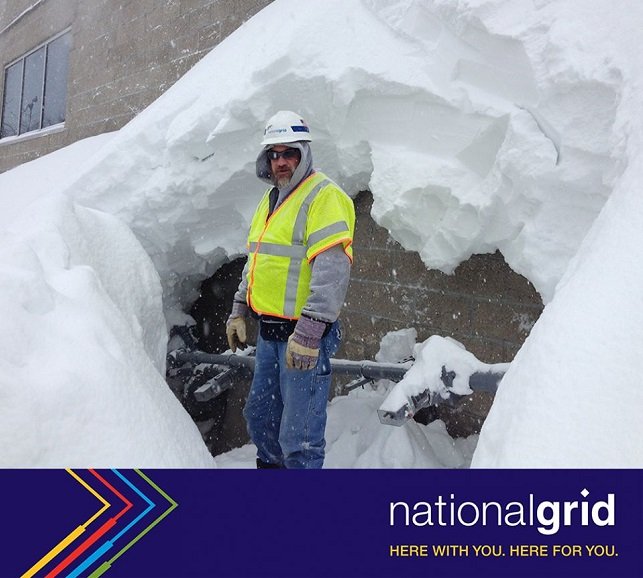Syracuse, NY - January 21, 2016 - As snow accumulations continue to mount across the region and with more snowfall forecasted over the coming days, National Grid is urging everyone to take precautions to avoid the potential hazards these conditions present. At many homes and businesses, the deep snowpack and additional snow left by snow removal equipment is clogging vents to furnaces and other appliances. In addition, many roofs are laden with ice and snow overhanging natural gas equipment. Both conditions can lead to trouble.
Ice and Snow Buildup Poses Risk to Gas Equipment
The buildup of ice and snow around or over natural gas meters, regulators and pipes can pose a serious safety risk as well. Ice and snow falling from a roof can damage gas meters or service connections to customers’ homes or businesses, resulting in potential gas leaks. Anyone detecting the odor of natural gas should call National Grid. If the odor is present inside your building, leave the premises immediately and call from outside or a neighboring building.
Snow removal equipment operators also should be aware of the presence of natural gas equipment and avoid coming in contact with meters, hitting outside gas risers, or piling snow around vents mounted on the outside of buildings, which can cause the dilemma illustrated below.
CO Safety
Carbon monoxide (CO) is a byproduct of fossil fuel combustion. Ice and snow that block natural gas appliance vents can cause CO to back up into a building, resulting in carbon monoxide poisoning to those inside. National Grid advises natural gas customers to closely inspect areas around vents for snow and ice build-up and to remove anything that is blocking those vents. Carbon monoxide is odorless and can build up to dangerous levels without building occupants being aware that it’s present. Customers are encouraged to install CO detectors in their homes and to test detectors that may already be installed to ensure that they are in working order
If you do detect an odor of natural gas or suspect carbon monoxide is present in your home, go outside immediately and breathe deeply. If CO poisoning symptoms, such as headaches or drowsiness are severe, call 911 immediately.
After calling 911, call National Grid’s emergency contact number at 1-800-892-2345.
About National Grid
National Grid (LSE: NG; NYSE: NGG) is an electricity and natural gas delivery company that connects nearly 7 million customers to vital energy sources through its networks in New York, Massachusetts and Rhode Island. It is the largest distributor of natural gas in the Northeast. National Grid also operates the systems that deliver gas and electricity across Great Britain.
Through its U.S. Connect21 strategy, National Grid is transforming its electricity and natural gas networks to support the 21st century digital economy with smarter, cleaner, and more resilient energy solutions. Connect21 is vital to our communities' long-term economic and environmental health and aligns with regulatory initiatives in New York (REV: Reforming the Energy Vision) and Massachusetts (Grid Modernization).
For more information please visit the website, or Connecting website, follow on Twitter, watch on YouTube, go to Facebook, find photos on Instagram










